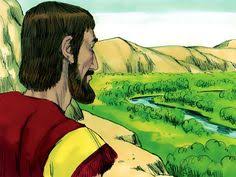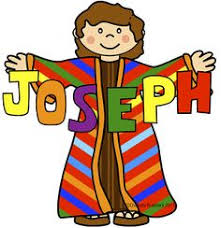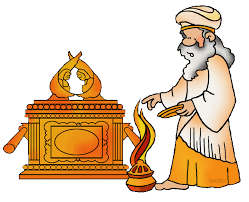Joshua 13:7 – Now therefore divide this land for an inheritance to the nine tribes and half the tribe of Manasseh."

In out last post, God spoke to Joshua and instructed him to stop thinking and planning for further conquest of the Promised Land. Instead, he was to move forward with dividing up the land amongst the tribes. At that point, it would be up to each individual tribe to subdue any enemies that remained in their new territory.
Does the division of the entire land seem like a big job to you? It probably did to Joshua as well. Fortunately for him, he was not alone in this task. God himself had already hand-picked a council to assist him. The council consisted of one priest (Eleazar) and one leader from each of the tribes:
Numbers 34:17-18 -These are the names of the men who shall divide the land unto you: Eleazar the priest, and Joshua the son of Nun. And you shall take one leader of every tribe, to divide the land by inheritance.
In case you are interested, Numbers 34:19-29 provides a complete list of the men who were chosen. Although we don't know anything about them, God certainly knew who they were. Each of the men on the list were gifted by God to assist Joshua in this enormous and difficult task.
Notice that the Lord instructs them to divide up the land among the '9 tribes and the half tribe of Manasseh'. Why was the land being divided up into 9 districts instead of 12?
Joshua 13:8 – With the other half of the tribe of Manasseh, the Reubenites and the Gadites received their inheritance, which Moses gave them, beyond the Jordan eastward as Moses the servant of the Lord gave them:
Basically, two tribes (Reuben and Gad) along with half of the tribe of Manasseh, had already been allotted a portion of land as their inheritance. This had been done by Moses, before they crossed the Jordan.
In order to better understand the division of the land, let's review some of the main points about the tribes of Israel.
God called Abraham out from among his people to be the father of the Hebrews. Abraham had a son named Isaac, and Isaac had a son named Jacob. At one point, Jacob had an intense encounter with the Lord, in which they wrestled all night. At the end of that encounter, the Lord changed his name from Jacob (to supplant or circumvent) to Israel (God perseveres) (Genesis 32:25-30).
Israel (formerly Jacob) had two wives and two concubines and together they bore him 12 sons. The names of his sons were Reuben, Simeon, Levi, Judah, Issachar, Zebulon, Joseph, Benjamin, Dan, Naphtali, Gad and Asher. The offspring of these twelve men became the tribes of Israel.
Right about now, I picture you with a questioning look on your face because you know that there is no such thing as the tribe of Joseph. What happened in that case?

Joseph was the favorite son of his father Israel; as you recall he was given a coat of many colors (Genesis 37:3). Because of their father's favoritism, the other sons of Israel were very jealous of Joseph. Eventually Joseph's brothers sold him into slavery in the land of Egypt (Genesis 37:12-28). But God's hand was upon Joseph, and he became very powerful - second in command under Pharaoh.
During the time Joseph lived in Egypt, he had two sons: Ephraim and Manasseh. Once Joseph's family was reunited with him, Israel essentially claimed his two grandsons as his own offspring.
Genesis 48:5 -And now your two sons, Ephraim and Manasseh, who were born unto you [Joseph] in the land of Egypt before I [Israel] came unto you into Egypt, are mine; as Reuben and Simeon, they shall be mine.
Thus, Joseph's posterity received a double portion of inheritance from Israel. The offspring of Ephraim and Manasseh became tribes of Israel instead of their father Joseph.
Of course, this presents us with yet another difficulty. If we remove Joseph from the list of 12 sons, and then add in Ephraim and Manasseh, that gives us a total of 13 tribes, instead of 12!
But that problem is easily explained. There are certain circumstances in scripture where the tribes are counted or treated differently. The division of the land is a good example. Long before Israel crossed the Jordan, God had decreed that the priestly tribe of Levi would not inherit a portion of land similar to the other tribes. Instead of being given a territory, they were eventually assigned specific cities within each of the other tribes.
The tribes that received allotments in Canaan west of the Jordan River were: Ephraim, half of Manasseh, Reuben, Gad, Asher, Zebulon, Naphtali, Dan, Judah, Benjamin, Simeon and Issachar. We will examine their inheritance in the next chapter.
Meanwhile, the remainder of Joshua chapter 13 records the land that was allotted to Reuben, Gad and the other half of the tribe of Manasseh, east of the Jordan River.
Scholars have noted that a disproportionate amount of attention seems to be given to the description of the inheritance of the two-and-a-half tribes east of the Jordan, especially since the book of Joshua centers on the conquest of the land west of the river. This may have been an attempt by the author to emphasize the unity of the twelve tribes, even though their inheritance was split apart by the Jordan.
At any rate, the author gives us the following description of the land in verses 9-13:
Joshua 13:9-13 - from Aroer, which is on the edge of the Valley of the Arnon, and the city that is in the middle of the valley, and all the tableland of Medeba as far as Dibon; and all the cities of Sihon, king of the Amorites, who reigned in Heshbon, as far as the boundary of the Ammonites; and Gilead, and the region of the Geshurites and Maacathites, and all Mount Hermon, and all Bashan to Salecah;
All the kingdoms of Og in Bashan, who reigned in Ashtaroth and in Edrei (he alone was left of the remnant of the Rephaim); these Moses had struck and driven out. Yet the people of Israel did not drive out the Geshurites or the Maacathites, but Geshur and Maacath dwell in the midst of Israel to this day.
As an FYI, the two-and-a-half tribes that received an inheritance on the east side of the Jordan River are often referred to as the Transjordan tribes. If you come across this term in your personal studies, keep in mind that it refers to Reuben, Gad and half of Manasseh.
The rest of the book of Joshua (including chapter 13) contains a seemingly endless list of cities, towns, mountains, and bodies of water which elucidate the borders/boundaries of the tribes.

While this may seem somewhat boring to us, it was vitally important to Israel. The information in this account became the official record of land distribution. It was used to settle any disputes that arose over borders/ownership of the land.
Having said that, we must also keep in mind that the borders of the tribes were somewhat fluid in the beginning, because some tribes needed more space (and some less) than what was allotted. We will look at this topic in greater detail in our next post.
I would also like to mention that we are not going to attempt to pinpoint or discuss all the cities, mountains and valleys described in the land distribution.� Instead, we will refer to the general boundaries of the tribes.
To begin with, let's get a general idea of the boundaries of the entire Promised Land. When doing so, it is helpful to consider the main bodies of water in the region.
The western border of the Promised Land (Israel) is the Mediterranean Sea. The eastern border was technically the Jordan River, although the allotment of the two-and-a-half tribes was east of the river. The Dead Sea is at the southern tip of the Jordan, while the Sea of Galilee is to the north. Both seas fall within the Promised Land. We can easily pinpoint the Jabbok River and the Arnon River, which flow into the Jordan from the east. These rivers mark the general boundaries of the Transjordan tribes.
Based on these landmarks, the following map shows the general boundaries of the Promised Land, as well as the approximate inheritance of the twelve tribes:

On the eastern side of the Jordan, we find that Reuben had the territory to the south, with Gad nearer the Jabbok River and Manasseh in the north. All this land was formerly held by the kingdoms of Sihon and Og.
However, we cannot help but notice that while the scriptures focus on the promises of God and the victories of Israel, there were times when God's promises were limited by Israel's failure to fully obey the commands of the Lord.
For instance, the Transjordan tribes failed to drive out the Canaanite kingdoms of Geshur and Maacath. Therefore, these heathen nations continued living in the land, not only causing trouble, but enjoying the blessings that should have been for Israel alone. Why would the tribes allow their enemies to remain in the land?
It has been speculated that Israel simply grew content with what they had. They lost the desire to possess all the blessings that God had in store for them. In other words, they settled for second best.
Do you think that is a sad commentary on the children of Israel? I do. But then I must immediately examine myself. Have I accepted/received every temporal and spiritual gift that God wants to give me? Or have I reached a point where I am content with what I have and what I have accomplished for the kingdom of heaven? If so, what amazing gifts and opportunities have I left on the table?
These are questions worthy of our consideration/meditation.
Here is something else for us to think about: There are many Christians who continue to think of God as a stingy tyrant. They believe one must cry and beg God in order to receive the smallest and meanest blessings. THIS IS COMPLETELY UNTRUE.
Our heavenly Father is warm, generous, and loving. He desires to bless us at a level beyond our comprehension.
Ask yourself this question – what is the most priceless gift in the universe? It's the blood of God's only Son, Jesus, right? Well, God freely gave us that gift already. Since that is the case, why would he deny you a lesser gift/blessing?
Romans 8:32 – He who did not spare his own Son but gave him up for us all, how will he not also with him graciously give us all things?
Instead of picturing God as a mean tyrant, picture him seated on his eternal throne with countless stacks of blessings at his side. Picture him trying to get your attention long enough to give you something astonishing.
Imagine the joy, laughter, intimacy and pleasure you will share with him as you use and enjoy that gift. Whatever you are picturing right now is more accurate than your concept of God as a stingy ogre!
God has begun a shaking of our world. This shaking will destroy the institutions of man and leave the lost searching for a sure foundation for their lives. You and I need to be fully equipped and ready to reap the harvest of souls for the kingdom of God. Let's make sure we aren't leaving behind any gifts or equipment we may need for this task. Let's not settle for second best.
Joshua 13:14 – To the tribe of Levi alone Moses gave no inheritance. The offerings by fire to the Lord God of Israel are their inheritance, as he said to him.
In this official account of the division of the Promised Land, the tribe of Levi did not receive an allotment of land as their brothers did. Instead, Levi inherited the offerings made to the Lord. They also received individual cities which were scattered throughout the Promised Land, on both sides of the Jordan River.
Why do you suppose God treated the Levites differently?
Keep in mind that it was the job of the Levites and priests to operate/maintain the tabernacle and act as the religious instructors for the rest of the nation. They were what we would call 'full time pastors'. They were to be about the business of spreading knowledge of the Word of God throughout the nation, stirring up their brethren to a devout religious life, and enforcing the laws of God.

In order to perform these duties, they needed time to do the work of the tabernacle, time to study and time to minister to others. If they were constantly at war trying to remove Canaanites from a territory or working to get their homes and cities built up, they would not have any time for the spiritual duties which God had assigned them.
For this reason, God blessed the Levites with a portion of his offerings - the first fruits and tithes as well as the showbread, etc. These offerings were used to sustain/provide for the Levites:
Numbers 18:20 - And the LORD spoke unto Aaron, You shall have no inheritance in their land, neither shall you have any part among them: I am your part and your inheritance among the children of Israel.
(See also Deuteronomy 18:1-2, Numbers 18:23-24). So, we find that God did not just bless his people with a one-size-fits-all kind of gift. Instead, he blessed each tribe with the gifts that were in their best interest.
The remainder of this chapter is a more detailed look at the exact cities and villages that were assigned to the specific families within the two-and-a-half tribes. Feel free to read it if you like; I have briefly summarized them below.
Again, these lists serve as an official record of ownership. They also prove that God did exactly has he promised; he brought his people into the land flowing with milk and honey!
Joshua 13:15-23 – And Moses gave an inheritance to the tribe of the people of Reuben according to their clans.So their territory was from Aroer, which is on the edge of the Valley of the Arnon. And the border of the people of Reuben was the Jordan as a boundary. This was the inheritance of the people of Reuben, according to their clans with their cities and villages.
Joshua 13:24-28 – Moses gave an inheritance also to the tribe of Gad, to the people of Gad, according to their clans. This is the inheritance of the people of Gad according to their clans, with their cities and villages.
Joshua 13:29-32 – And Moses gave an inheritance to the half-tribe of Manasseh. It was allotted to the half-tribe of the people of Manasseh according to their clans... These are the inheritances that Moses distributed in the plains of Moab, beyond the Jordan, east of Jericho.
Joshua 13:33 – But to the tribe of Levi Moses gave no inheritance; the Lord God of Israel is their inheritance, just as he said to them.
Let me offer you some encouragement:
Have you ever received a corporate gift from your employer that you didn't really enjoy that much? I know I have. That normally occurs because the corporation is attempting to pick out a single gift that would be pleasing to everyone, which is an impossible task. No matter what they do, someone will wind up being unhappy or disappointed.
Here is a word to encourage you: Our God never gives one-size-fits-all gifts!
God gave a unique inheritance to each of the tribes, especially the tribe of Levi. In the same way, God has created each one of us with a unique combination of gifts, talents and desires. Holy Spirit then blesses us with spiritual gifts that will compliment the way God made us, so that we can be effective in his kingdom:
I Corinthians 12:1, 4-7 – Now concerning spiritual gifts, brothers, I do not want you to be uninformed. Now there are varieties of gifts, but the same Spirit; and there are varieties of service, but the same Lord; and there are varieties of activities, but it is the same God who empowers them all in everyone. To each is given the manifestation of the Spirit for the common good.
Wow! What a blessing. I encourage you to be confident in the gifts God has given you. Don't be afraid to be you – in other words, don't bury or hide your gifts because they seem different or unique. Be sure to use them because God has created you to be a blessing to the body of Christ!
Let me offer you some relief:
Nobody is perfect, not even Moses or Joshua. But these great men of God did have one thing in common – they were faithful to God. They faithfully and steadily continued in the work that God had given them until the very end of their lives. God is always pleased with this kind of faithfulness.
In the New Testament, we find the parable of the talents (Matthew 25:14-30). As you recall, one servant received 10 talents, another 5 and another one. Their mission was to use the talents for the benefit of their master and his kingdom.

When the master returned, the servants were not judged on the amount of profit they made. They were rewarded for faithfully using the talents he had given them. The only servant to be judged as wicked was the one who buried his talent and refused to use it.
This parable plainly shows that God grants each of us different talents and abilities. It is our job to use what we have for his kingdom. Even though we may make mistakes, as long as we are faithful and do our best, God will ensure that we 'make a profit' for his kingdom. The only way to truly fail is to give up or never use your talent at all.
Therefore, as the apostle Paul advises us, let's put our mistakes behind us and continue in the work of the kingdom:
Philippians 3:13-14 – Brothers, I do not consider that I have made it my own. But one thing I do: forgetting what lies behind and straining forward to what lies ahead, I press on toward the goal for the prize of the upward call of God in Christ Jesus.
Let me offer you some strength:
The division of the land was an enormous job, and Joshua wasn't a young man anymore. (Let's face it – when God says you are old, you are old!) This leads us to two important conclusions.
One, you are never too old to work for the Lord! Perhaps you are reading this post right now and you consider yourself to be old. If that is the case, you should rejoice! Folks in that season of life have a lot of advantages:
- You are retired – you have a flexible schedule allowing you to devote more time to prayer and the work of the Lord.
- You are finished raising children – you are no longer 'tied down' at home where you need to make sure your children are educated and chauffeured around!
- You have wisdom – you understand life in a way that can only come with experience.
- You have finances – having worked throughout life, you have the resources to be a real support to ministries and/or you have the ability to embark on mission trips, etc.
All these advantages make 'old' Christians extremely valuable to the kingdom!
Conclusion number two - if you are still here on planet earth, then God has something for you to do!
God uses people of all ages, so no matter what your season of life, find the task that God has commissioned you to perform, and be faithful to it. Regardless of the size of the job, I assure you he will give you the strength to get it done, just as he did for Joshua!
